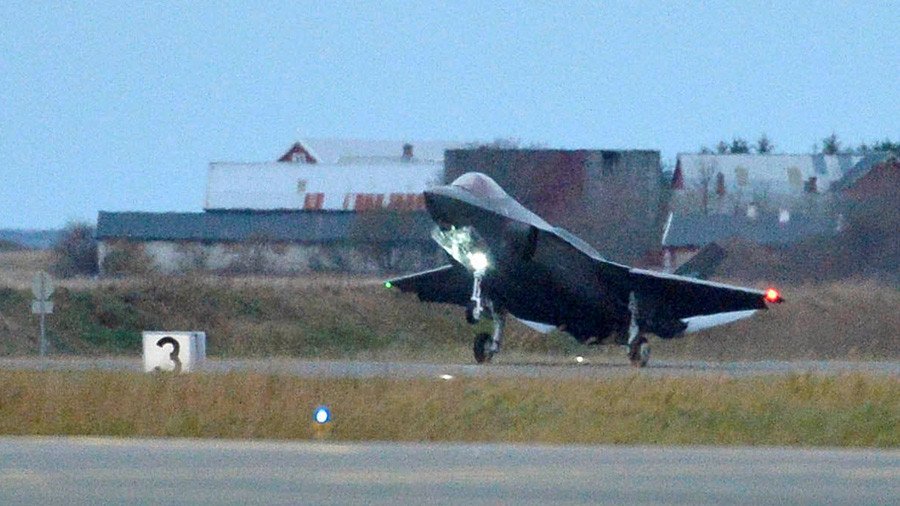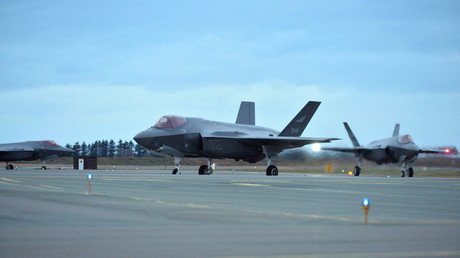Will US partners still buy F-35 jets despite ‘phenomenal upkeep cost’ and snooping?

Claims by Norway that its F-35 fighter jets might be sending sensitive data to their American manufacturer may prompt US partners to take a second look at the idea of using these jets, says Binoy Kampmark, a senior lecturer at RMIT University, Melbourne.
The Norwegian military claims that the planes send sensitive data to their manufacturer in the US, Lockheed Martin, after every flight. Earlier in November, Norway received the first three of its 40 F-35 fighter jets it ordered in an effort to beef up its air force.
“Due to national considerations, there is a need for a filter where the user nations can exclude sensitive data from the data stream that is shared by the system with the manufacturer Lockheed Martin,” said Defense Ministry senior consultant Lars Gjemble, as cited by Norway’s ABC Nyheter.
Binoy Kampmark, a senior lecturer at Melbourne's RMIT University, says other countries may now be put off buying the jet.
“It is problematic because it is to be expected in a sense that the particular manufacturer of these products was bound to come with some facility of monitoring the performance. Like the manufacturer of devices anything from fridges to phones to mechanisms like that – there are facilities by which the manufacturer can identify data in any case,” Kampmark told RT.
“It is not particularly special to the F-35. But what it is special about is its military application. And largely, because it is very big deal and rather troublesome deal with the F-35 with Norway that people would be raising their eyebrows as well. The performance of the dataset will be something that Lockheed Martin is keen on, but the Norwegians won’t necessarily be too thrilled,” he added.
Kampmark said: “It is a security concern. It is something that the manufacturing company is, certainly, in the military business aware of. But the fact is that precisely, because it is an aviation armaments industry, then the manufacturers are very aware of wanting to see that their product is not compromised.”
Norway should have expected it and I would be very surprised if this is the only instance of the sort. Let’s face it – it is not just very expensive fighter aircraft, but refrigerators and coffeemakers and every other thing people buy [that] has a computer in it, and these things are always talking to each other. That is what they call the Internet of Things. This is much more sophisticated version of that. But almost every device, especially something as dependent on computers as fighter aircraft, is always is talking to somebody and is exchanging all sorts of data, especially with the manufacturer - Jim Jatras, a former US diplomat, told RT.
In Kampmark’s opinion, it is all part of the global issue of information interception and vulnerabilities.
“In a sense, there is a constant race of how to intercept, use and store such data,” he said.
“The reality of this is that if you are dealing with the company like Lockheed Martin, if you are dealing with manufacturers, if you are dealing with the Trump presidency, they are always going to be looking out for their interests. In this particular case, if you are in the business of purchasing such weapons and you are purchasing such products, it does come with the risk and that is the reality of the arms business,” he explained.
Kampmark recalled that initially the purchase of F-35s was already considered a controversial blow in terms of the Defense Ministry and that US President Trump “made fun and mocked” the program.
The expert went on to say that while it has been advertised as being highly sophisticated multi-operational system, it also costs a “phenomenal amount.”
“It costs a lot to keep and the upkeep costs are very high,” he noted.
“Certain defense forces that have an operability or interoperability with the US forces, those, for example, like Australia, are very happy or will continue being involved with such machines as the F-35 but other countries with greater flexibility may take a second look at this,” he added.













